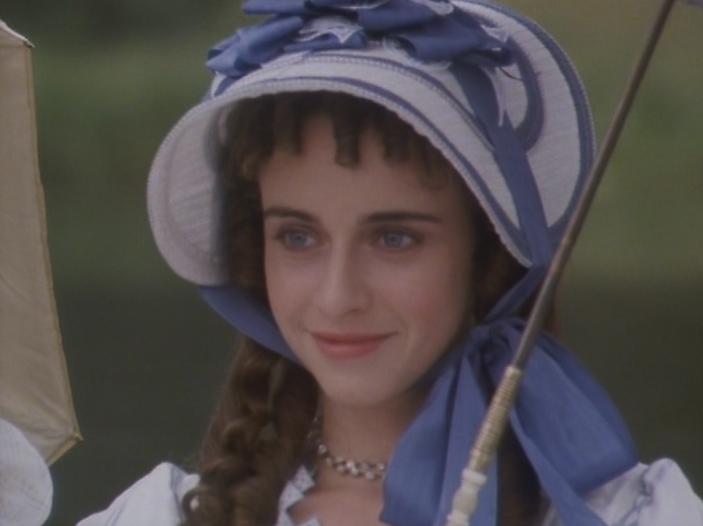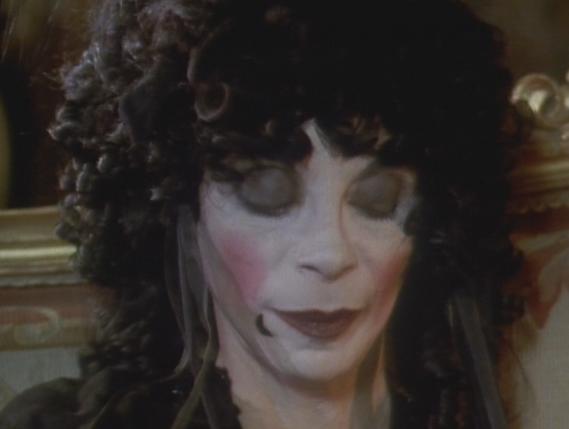It was hard for me to find information about the adaptation through IMDB because, silly me, I was searching for "Northanger Abbey." This adaptation can be found instead when you search for a BBC Television Series called Screen Two which apparently ran for 10 seasons, with a dozen or so programs run in each season. Screen Two includes a strange hodgepodge of adaptations and original plays and other works.
I have not seen anything else from that TV series, but I do notice, while thumbing through the list of programs aired by Screen Two, that many have quirky or gritty sounding titles such as: "Streetlife," "Return to Blood River," "Black Easter," "Hedgehog Wedding," and the like.
 Northanger Abbey's inclusion in this series provides an interesting clue into the oddness of the adaptation. I would bet that Screen Two had a late time slot and an off-beat audience with programming that focused on darker and maybe slightly erotic themes. I wouldn't be surprised if someone on the production team was a fan of Austen and that Northanger Abbey was picked because, of all Austen's work, it had the most to play with along those darker, Gothic lines.
Northanger Abbey's inclusion in this series provides an interesting clue into the oddness of the adaptation. I would bet that Screen Two had a late time slot and an off-beat audience with programming that focused on darker and maybe slightly erotic themes. I wouldn't be surprised if someone on the production team was a fan of Austen and that Northanger Abbey was picked because, of all Austen's work, it had the most to play with along those darker, Gothic lines.There is some confusion about the date of this adaptation. Wikipedia states that it came out in 1986 and suggests it was a joint project of the American channel A&E (which was in its infancy then) and of the BBC. The article is sparsely cited, but supported by the fact that at the tail end of the dvd, the credits have a copyright date of 1986. IMDB, on the other hand, states that the version was originally aired on February 15, 1987 (as part of Screen Two). According to the Jane Austen Center, it may have also been shown on Masterpiece Theater in December of 1987. I'm not sure I'll be able to unravel its exact roots, but there is no doubt in my mind that it was produced by a set of people looking to do something different.
 I don't mind reading criticism of the version which is oh so easy to find fault with, but I do think that its right to take into account what the production goals for this piece might have been before skewering it. I admit this is all conjecture, but, I think the production team for this adaptation were trying to produce a campy, almost Rocky Horror Picture Show type production, possibly for an audience who favored generally offbeat shows. (Take one look at the Marchioness if you don't believe me). And they did manage to do that. I wonder what the reception to the show was in the context of Screen Two at the time it was released.
I don't mind reading criticism of the version which is oh so easy to find fault with, but I do think that its right to take into account what the production goals for this piece might have been before skewering it. I admit this is all conjecture, but, I think the production team for this adaptation were trying to produce a campy, almost Rocky Horror Picture Show type production, possibly for an audience who favored generally offbeat shows. (Take one look at the Marchioness if you don't believe me). And they did manage to do that. I wonder what the reception to the show was in the context of Screen Two at the time it was released.I wish I could know how it was received then, but there is no question that it is a hard program for most Jane Austen fans to like. One of the most difficult obstacles to overcome is the musical score, which is jarring and which I find almost unbearable. However, that said, I bet the music sounds better if you are stoned, and my guess is that is what this audience probably was. I felt stoned just watching the adaptation. You might have to be to appreciate the overdone 80s makeup on all the girls, but for me that too was nearly unbearable.
 I've watched this a couple of times before, but I popped this version into the dvd the other day because, having been so immersed in Spooks (MI-5) lately and loving Peter Firth in that, I thought it would be fun to see a younger version of him in this production playing a romantic lead.
I've watched this a couple of times before, but I popped this version into the dvd the other day because, having been so immersed in Spooks (MI-5) lately and loving Peter Firth in that, I thought it would be fun to see a younger version of him in this production playing a romantic lead.His performance as Henry Tilney is very interesting. He is both oddly compelling and slightly repulsive. He is clearly a very capable actor, so I have to believe he is taking this approach on purpose. I think he is trying to match his performance to direction ... a direction to be suggestive and ambiguous but also appealing. I think he manages that quite well. I also think Katherine Schlesinger as Catherine Morland is basically appealing and pulls off the idea of wide-eyed breathlessness overrun by fantasy and caught in the middle of a bigger and more confusing world than she was expecting. I can't stand watching Cassie Stuart's constant and ridiculous grinning and primping as Isabella Thorpe, nor her brother's grossness and violence (played by Jonathan Coy). The lovely actress who plays Elanor Tilney (Ingrid Lacey), is the only one who didn't get the memo and is acting as if she is in a Jane Austen production : ) She seems so out of place in this adaptation where everyone else is camping it up. At least they gave her some insane twisted curls in her hair.
I did enjoy the scenery and locations, including the Royal Crescent in Bath and Bodiam Castle - both of which we saw when in England last year and were greatly impressed with.
All in all I find this production more interesting as a puzzle - who did this and why?? - than enjoyable as a Jane Austen adaptation.
If you like seeing Peter Firth in his earlier roles, check out Equus. I saw it recently and was impressed.
"Northanger Abbey: The Version that Everyone Hates" LostinBritishTV
Don't forget Peter Firth as Angel Clare!
ReplyDeleteCame across your post looking for opinions on this adaptation. The 'Screen Two' initiative (along with 'Screen One' and 'Play For Today') was in response to (British) Channel 4's groundbreaking original programming with a fairly deliberately wide range of programming and styles, each production was a standalone creation, just aired under the umbrella of the 'Screen Two' collection. Even if most of what they funded was, let's say, tosh, there are some crackers in there, especially in the latter years, presumably as they got up some momentum, and involved some impressive stars (Gary Oldman, Liam Neeson, John Malkovitch, Helen Mirren etc). They have done some other British literary classic adaptations, and if you haven't seen them you should have a look, even if just out of curiosity: 'Enchanted April' (1992) is pretty good, I knew and loved that prior to knowing it was part of this collective, the 'Persuasion' made in 1995 is not terrible - the 2007 is better but I don't personally think any adaptation of Persuasion is particuarly good, I don't know what your opinion is -, 'The Hour Of The Pig' is a hilarious adaptation of a stage play set in medieval England starring Ian Holm and a P+P era Colin Firth. Incidentally, to comment on something you mentioned in another post and change the topic completely, Gwyneth Paltrow's english accent is pretty uniformally good, one of the few ;)
ReplyDeleteAwesome comment! Thanks so much for all this info. Where were you when I was researching this one!? ;) I had no idea that the 1995 Persuasion was part of Screen Two. I thought it had been a cinematic release. I agree with you that I've not really seen e a great Persuasion adaption but gave this and the other ones a lot of thought in a couple other posts here on my blog. I think I gave the narrow nod to 1995 for the production, but gave the acting nod to 2007. Anyway I appreciate all the suggestions and your deep knowledge of this. Thanks! (Don't know why Paltrow's accent grates on me; but have heard from others too that she's not as bad as I think she is. haha).
DeleteScreen Two were made for television films that was supposed to bridge the gap between television and cinema. Each year would have a varying range of films.
ReplyDeleteSeveral of the Screen Two productions were released in the cinema in the UK and USA. One of which was Truly, Madly Deeply which was Anthony Minghella's directorial debut. Enchanted April received a couple of Oscar nominations.